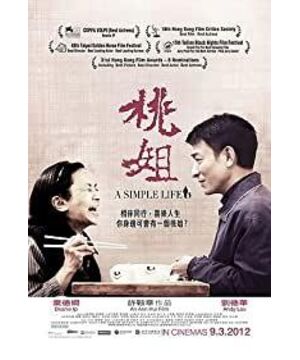The film tells the story of Sister Tao, an old servant who has worked in the Li family for more than 60 years, from being sick to finally entering a nursing home to spend her later years. The whole drama is about the relationship and emotional changes between Sister Tao and the eldest young master of the Li family. The title first explains the identity of Sister Tao and the relationship between Roger and Sister Tao. I remember when Sister Tao first appeared, her face was a little wrinkled and her hair was a little gray, but she was in good spirits, and she didn't even know that she was being played with by merchants in the vegetable market. Wholeheartedly bought a table of hearty dishes for roger. At that time, Roger and Sister Tao were still two strangers in the relationship between master and servant. Roger didn't even look at Sister Tao when they were eating, but Sister Tao was always unilaterally greeting Roger. He had never been at the dinner table, and after helping him make dessert, he ate alone in the kitchen. Roger wanted to eat beef gizzards. Sister Tao didn't give him it, but in the end she helped him cook it. Almost the entire clip uses objective lenses to observe the peach sister and roger from the perspective of a bystander. At this time, Sister Tao's sudden stroke was the catalyst for their relationship to advance. The camera took us to Sister Tao’s nursing home. When Miss Cai and Sister Tao pushed open the door of the nursing home, I seemed to be inquiring about a smell of disinfectant and the rotten smell unique to the elderly. Many elderly people were sitting in the hall. Some were yawning, some were moaning, everyone was doing their own thing, but they lacked the most important communication between people. When Sister Tao came in, they all looked at her with inexplicable eyes. It is a lonely and shady look. Although the director did not give a particularly obvious subjective evaluation, I also know that Sister Tao's life here will not be easy. When Miss Cai brought Sister Tao into the room, the director used a long lens to look up at a low level and photographed Sister Tao's back, which imitated the perspective of an old man in a wheelchair behind him, and further highlighted the relationship between the elderly and society. estranged. After arriving in the room, Miss Cai's impersonal conversation, the broken fan and the decoration of the cold room also reflected this social problem. The only destination for this group of homeless elderly people is the government's compassionate pension and nursing homes, but in such a stereotyped format in today's society, people always go their separate ways, and no one will ever worry about your life or death. , the nursing home is even more desolate.
The relationship between Roger and Sister Tao may have changed step by step. Roger came to visit Sister Tao at the nursing home. Many other elderly people were looking out and curious. When asked about their relationship, Aunt Jin who was beside said casually. After saying, "God son?", Roger was stunned for a moment and admitted. I think at this moment, Sister Tao's face full of age spots is a little tired, but she always looks happy when she hears this sentence. Roger took Sister Tao to the park that they often go to in the future, and there is a clear contrast between the distance between the characters and the back. Roger walked alone in the front, and Sister Tao followed behind, and even Roger kept calling When it comes to business, this is more like an implementation of roger's obligation to sister Tao, and sister Tao is also very content, but when roger took sister Tao to the park for the second and third time, he dragged sister Tao's hand, and even asked her. Sister Tao was holding his arm, and this apparent change in distance also proved the change in the relationship between Roger and Sister Tao, inadvertently or deliberately. When roger and three or two friends gathered at home, someone discovered the beef gizzard made by Sister Tao. After a few people ate it, they recalled how good Sister Tao was. The camera unconsciously gave a close-up of Roger's face, and there were several shots after that All brought to his face. In fact, he has been secretly observing Sister Tao's every move. That expression is a kind of distress for Sister Tao, and it is also a heartfelt recognition of Sister Tao's identity. Roger is an executive producer, and when the movie premiered, he did not bring his real family, but his godmother, Sister Tao. After the movie, the two walked out of the cinema and met Sister Roland, a well-known actress in Hong Kong. This is a very dramatic scene. Two people of almost the same age are living two completely different lives. Sister Roland is dressed in a famous brand and is respected. She is picked up by a special chauffeur, while Sister Tao on the right has only Roger. The stronger the contrast, the more it reflects the cruelty of this society. The cruelty is cruel, but it is very realistic. Then roger still held Sister Tao's hand as always, or the back of the two, and slowly moved away from the camera. A long shot from the same angle expresses completely different things. At that time, Sister Tao was sick, helpless, lonely and helpless, but at this time, although Sister Tao was still hunched over, the people around her were not doctors. But Roger, one old and one young, walked forward talking and laughing. I don't know if I was wrong, but Sister Tao's steps were much lighter. After Sister Tao passed away, Roger was at home downstairs. Sister Tao seemed to be upstairs with the lights on and waiting for him to come back. She cooked a table of good dishes and washed and dried every piece of clothing. Clean and kind. But in the blink of an eye, the deceased is like this.
"Sister Peach" is a realistic film, which not only reflects the emotional problems of modern people, but also contains many social problems. Like in the title, Roger, Tsui Hark, and Sammo Hung are three filmmakers, and the three acted in a play to trick investors into investing more money. This actually reflects the director's self-deprecating self-deprecating film production industry. There are also the old people sitting around the Mid-Autumn Festival waiting for piles of TV stations, social organizations to "show love" for them, the female singer who showed disgust after singing, and finally the old people heard that someone was coming. During the "visit", one by one complained incessantly, which reflected the common "show" problem in modern society. In fact, what is more valuable is that Xu Anhua was neither humble nor arrogant, neither accusing nor encouraging. These are indeed problems, but they are also reality. The director did not give the beauty or ugliness of things, but left it to us to judge.
I think what the director actually wants to say is that even if the society we live in sometimes disappoints us, it is not difficult to find that as long as we are willing to pay attention, we will surely discover the true feelings. When I go home for the New Year, or I am leaving, I call you and tell you to take care of your health. Maybe it is the laughter and laughter of everyone playing mahjong together, or even though we are not very familiar, we even have conflicts. But if you die, I will present a bouquet of roses at your funeral to thank you for your usual care for me. We may not remember these usually the smallest details, but when we are sad, we may be able to look back a little, because these are our most precious treasures.
"Sister Peach" won the Best Picture at the 2011 Hong Kong Film Awards, Ip Dexian won the Queen's Film Award, and Xu Anhua also won the Best Director. The great acclaim of "Sister Peach" reflects the return of current social values, and it also represents a trend of movies. Among the many noisy, complicated and unrealistic movies, "Sister Peach" seems to blow a fresh breath for us. The wind, let us experience the deep true feelings sketched with light brush and ink, which is the happiness of the audience, thanks to Xu Anhua.
View more about A Simple Life reviews











